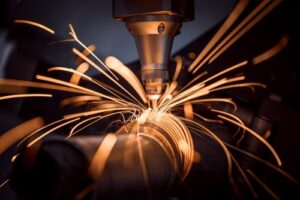 Metal machining is a critical process in the manufacturing industry, providing precision and customization for various metal components. From cutting and shaping to drilling and finishing, machining processes play a crucial role in creating high-quality metal parts. In this blog post, we will explore different industrial metal machining processes and their key features, helping you understand their applications and benefits.
Metal machining is a critical process in the manufacturing industry, providing precision and customization for various metal components. From cutting and shaping to drilling and finishing, machining processes play a crucial role in creating high-quality metal parts. In this blog post, we will explore different industrial metal machining processes and their key features, helping you understand their applications and benefits.
1. Turning:
Turning is a common machining process that involves rotating a workpiece against a cutting tool to remove material and create cylindrical shapes. This process is typically used to produce shafts, valves, and other round components. Turning operations can be performed manually, using lathes, or with the help of computer numerical control (CNC) machines for enhanced precision and efficiency.
2. Milling:
Milling is a versatile machining process that utilizes rotary cutters to remove material from a workpiece. The cutting tool moves in multiple directions, allowing for the creation of a wide range of shapes and features. Milling machines can perform various operations, such as face milling, slotting, and contouring. This process is commonly used in the automotive, aerospace, and electronics industries to create complex components.
3. Drilling:
Drilling is a machining process focused on creating holes in metal pieces. It involves using a rotating drill bit to remove material and form cylindrical cavities. Drilling machines can perform simple drilling operations or more complex processes like counterboring, countersinking, and reaming. This process is crucial in industries such as construction, oil and gas, and electronics.
4. Grinding:
Grinding is a precise machining process that uses an abrasive wheel to remove material and achieve a smooth surface finish. It is commonly used to create tight tolerances and improve the dimensional accuracy of metal parts. Grinding machines can be manual or automated, providing excellent control over the material removal process. This process is particularly important in industries like aerospace, automotive, and medical manufacturing.
5. Boring:
Boring is a machining process used to enlarge existing holes or create lateral holes with high accuracy and precision. It involves rotating a cutting tool and moving it along a pre-drilled hole to remove material and achieve the desired diameter. Boring is commonly employed in the automotive, aerospace, and hydraulic industries to produce cylinders, engine blocks, and other large components.
6. Broaching:
Broaching is a specialized machining process used to create intricate shapes and internal profiles. It involves pushing or pulling a broach tool through a workpiece, which gradually removes material and forms the desired features. Broaching machines are capable of producing keyways, splines, gears, and other complex shapes. This process is widely used in the automotive, aerospace, and tooling industries.
7. Honing:
Honing is a precision machining process used to improve the surface finish and dimensional accuracy of bores and cylinders. It involves using a rotating abrasive stone to remove material and create a smooth and polished surface. Honing is commonly used in applications where tight tolerances and a high-quality surface finish are essential, such as engine cylinders, hydraulic components, and precision tools.
Conclusion:
Industrial metal machining processes are vital in the manufacturing industry, enabling the production of complex, high-quality metal components. From turning and milling to drilling and grinding, each process offers unique capabilities and benefits. By understanding these machining processes and their applications, manufacturers can make informed decisions regarding the most suitable method for their specific needs. With the advancement of technology, automation and CNC machining have further enhanced the precision and efficiency of these processes, making them indispensable in modern metal fabrication.
Got Questions? Let Us Help!
Established in 1956, Metal Works Corporation is an A.S.M.E. certified industrial fabrication company specializing in pipe and tube bending, pipe fabrication, coiling, vessel fabrication, and welding for major industries. Metal Works Corporations in house’ machine shop has unique capabilities and produces specialty springs of all alloys, custom rotating mechanical seals, and various other industrial components. We appreciate customers and work to forge lasting relationships built on trust and reliability. Please contact us and allow our team to be the shortest distance between problem and solution for your unique industrial requirements.

